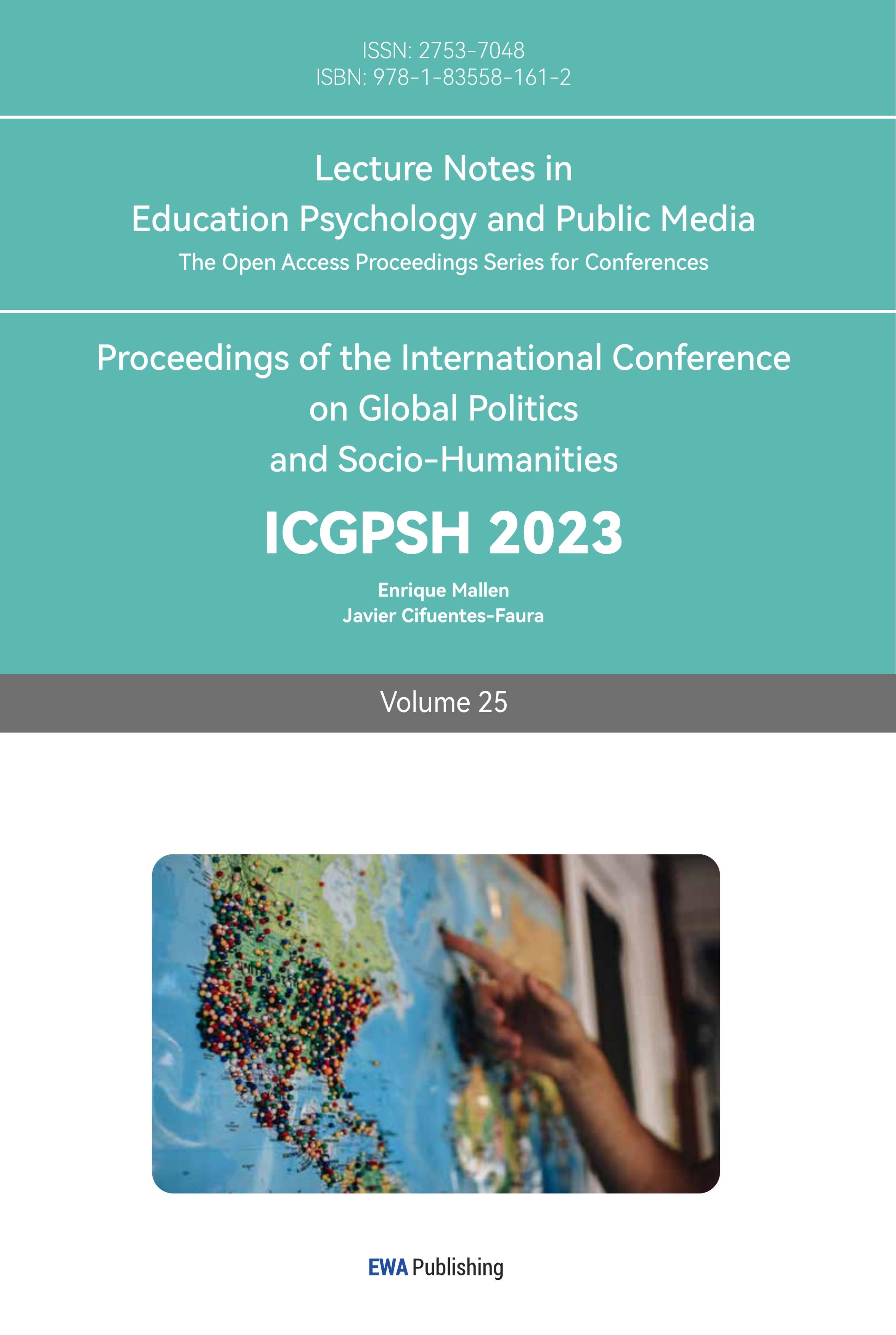References
[1]. Tang Ying, Chen Jiaju. (2016) The essence of Chinese “homeschooling”: A comparative analysis perspective. Journal of Shangrao Normal University, 66-70.
[2]. 21st Century Education Research Institute, Report on the Status of Homeschooling in China. Retrieved from http: //baby.sina.com.cn /news/2013-10-29 /175361757.shtml.
[3]. Wen Zhengbang. (1991) Legal Philosophy Reflections on Rights Issues. Chinese Jurisprudence, 52.
[4]. Zhang Zhen. (2007) Analysis of the Regulation of “Obligation to Education” in the Text of China’s Constitution and discussion of the “Mengmutang” incident. Modern Jurisprudence, 22-28.
[5]. Declaration of the Rights of the Child. The United Nations General Assembly adopted resolution 1386 (XIV) of 20 November 1959.
[6]. Asbjorn Eide, “Economic, Social and Cultural Rights as Human Rights”, in Asbjorn Eide, Catarina Krause, and Allan Rosas, eds, Economic, Social and Cultural Rights: A Textbook (Dordrecht/Boston/London: Martinus Nijhoff Publishers, 2001), p.23.
[7]. Liu Hainian. (2000) Study of the International Covenant on Economic, Social and Cultural Rights. Beijing: China Legal Publishing House.
[8]. Fan Xiushuang. (2000) On the right of parents to participate in school education. Teaching and Management, 8.
[9]. Zhang Ruifang. (2015) Analysis of the Legal Sources and Characteristics of “Homeschooling” in the United States, 48-54.
[10]. Mayberry M. (1995) Home schooling: parents as educators. International Journal of Control, 4-12.
[11]. Chen Zhike. (2007) Discussion on the legality of homeschooling. Journal of Tianjin Academy of Education Sciences, 5.
[12]. Meng Siqing. (2002) Investigation and reflection on homeschooling. Shanghai Education and Research, 53-56.
Cite this article
Liu,Y. (2023). An Analysis of the Legitimacy of Home Schooling and an Exploration of Its Path to Legalization in China. Lecture Notes in Education Psychology and Public Media,25,230-238.
Data availability
The datasets used and/or analyzed during the current study will be available from the authors upon reasonable request.
Disclaimer/Publisher's Note
The statements, opinions and data contained in all publications are solely those of the individual author(s) and contributor(s) and not of EWA Publishing and/or the editor(s). EWA Publishing and/or the editor(s) disclaim responsibility for any injury to people or property resulting from any ideas, methods, instructions or products referred to in the content.
About volume
Volume title: Proceedings of the International Conference on Global Politics and Socio-Humanities
© 2024 by the author(s). Licensee EWA Publishing, Oxford, UK. This article is an open access article distributed under the terms and
conditions of the Creative Commons Attribution (CC BY) license. Authors who
publish this series agree to the following terms:
1. Authors retain copyright and grant the series right of first publication with the work simultaneously licensed under a Creative Commons
Attribution License that allows others to share the work with an acknowledgment of the work's authorship and initial publication in this
series.
2. Authors are able to enter into separate, additional contractual arrangements for the non-exclusive distribution of the series's published
version of the work (e.g., post it to an institutional repository or publish it in a book), with an acknowledgment of its initial
publication in this series.
3. Authors are permitted and encouraged to post their work online (e.g., in institutional repositories or on their website) prior to and
during the submission process, as it can lead to productive exchanges, as well as earlier and greater citation of published work (See
Open access policy for details).
References
[1]. Tang Ying, Chen Jiaju. (2016) The essence of Chinese “homeschooling”: A comparative analysis perspective. Journal of Shangrao Normal University, 66-70.
[2]. 21st Century Education Research Institute, Report on the Status of Homeschooling in China. Retrieved from http: //baby.sina.com.cn /news/2013-10-29 /175361757.shtml.
[3]. Wen Zhengbang. (1991) Legal Philosophy Reflections on Rights Issues. Chinese Jurisprudence, 52.
[4]. Zhang Zhen. (2007) Analysis of the Regulation of “Obligation to Education” in the Text of China’s Constitution and discussion of the “Mengmutang” incident. Modern Jurisprudence, 22-28.
[5]. Declaration of the Rights of the Child. The United Nations General Assembly adopted resolution 1386 (XIV) of 20 November 1959.
[6]. Asbjorn Eide, “Economic, Social and Cultural Rights as Human Rights”, in Asbjorn Eide, Catarina Krause, and Allan Rosas, eds, Economic, Social and Cultural Rights: A Textbook (Dordrecht/Boston/London: Martinus Nijhoff Publishers, 2001), p.23.
[7]. Liu Hainian. (2000) Study of the International Covenant on Economic, Social and Cultural Rights. Beijing: China Legal Publishing House.
[8]. Fan Xiushuang. (2000) On the right of parents to participate in school education. Teaching and Management, 8.
[9]. Zhang Ruifang. (2015) Analysis of the Legal Sources and Characteristics of “Homeschooling” in the United States, 48-54.
[10]. Mayberry M. (1995) Home schooling: parents as educators. International Journal of Control, 4-12.
[11]. Chen Zhike. (2007) Discussion on the legality of homeschooling. Journal of Tianjin Academy of Education Sciences, 5.
[12]. Meng Siqing. (2002) Investigation and reflection on homeschooling. Shanghai Education and Research, 53-56.









